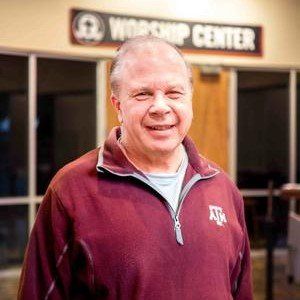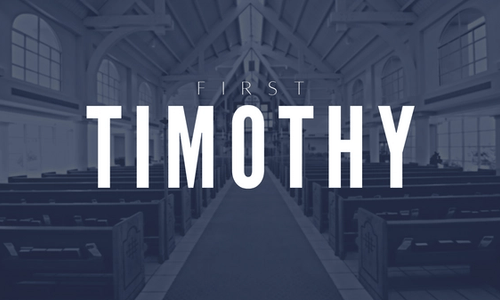Sunday Service 9am & 11am
Wednesday Service 7pm
(210) 920-6502
551 E Nakoma St.
San Antonio, TX 78216
Join a small group to study this sermon with like-minded believers.
1 Timothy 1:1-7
LISTEN. STUDY. APPLY
Video
Audio
Manuscript
Primary Points.
1. Christians are called to make disciples. Discipling and being discipled is a lifelong pursuit as a brother or sister in Christ.
2. We need to protect those entrusted to us, letting love guide our steps.
3. In the face of opposition, we need to pray, act as we lean on God’s Word and “stay the course.” Remember God is with us in these trials, and “walking through these struggles” is how we grow in our Christian walk.
As I begin, you may ask why is Bob teaching today. That’s a good question. Over the past year, God has laid on my heart in a couple of ways why I should be teaching. First, as an elder, God’s Word provides instruction concerning the responsibility of teaching. In Paul’s letter to Titus, he clearly states that an elder ” … will be able both to exhort in sound doctrine and to refute those who contradict it.” Secondly, I have been encouraged by others – other elders and my wife -- to use my spiritual gifts and 64 years of life experiences to share what God has been revealing to me with others. So, that is why I am up here today.
This morning, I will be teaching from 1 Timothy. So, you may ask why 1 Timothy, Bob? Well, during the past year, the New Testament letters have taken on added importance for me. The Book of Acts and Paul’s epistles have really helped me better understand the life of a New Testament (NT) believer and NT church life, and what we should be about as believers and as a church at VBVF. In particular, Paul’s first letter to Timothy has served as personal instruction to me this past year in serving as an elder and has been a primary source in my discipling relationships with various saints … more on discipleship later. So, my goal is to provide a verse-by-verse exposition of 1 Timothy with an emphasis on relating Paul’s words to Timothy as instruction to us here at VBVF in 2022.
Paul’s first letter to Timothy was written sometime between 62 and 65 AD after Paul was released from his first imprisonment in Rome – between his third and fourth missionary journeys. Unlike most of Paul’s other letters to churches, this is a very personal letter to Timothy -- someone he loves as a son and someone who has taken on a calling as Paul’s representative at the church in Ephesus. The letter is noteworthy because it provides the longest description in the New Testament about church organization including the qualifications and roles of elders and deacons. 1 Timothy is also known for its emphasis on preaching sound doctrine in the face of opposition. As noted on the slide, this short book of six chapters is packed with much guidance … for Timothy, the Church at Ephesus and us.
So, let’s begin. I am reading 1 Timothy 1, Verses 1 and 2, from the English Standard Bible (ESV)
1 Paul, an apostle of Christ Jesus by command of God our Savior and of Christ Jesus our hope, 2 To Timothy, my true child in the faith: Grace, mercy, and peace from God the Father and Christ Jesus our Lord.
Paul provides right upfront why his writing should be considered authoritative to Timothy and Timothy’s church at Ephesus. First, Paul states he is an apostle called by God – one who had actually seen Christ and had been endowed with special powers, like healing, from Christ. The personal encounter of Paul, previously known as Saul, with Christ came on the road to Damascus and is recorded in Chapter 9 of Acts. Acts 9, verses 3 through 6 state,
3 Now as he went on his way, he [Saul] approached Damascus, and suddenly a light from heaven shone around him. 4 And falling to the ground, he heard a voice saying to him, “Saul, Saul, why are you persecuting me?” 5 And he said, “Who are you, Lord?” And he said, “I am Jesus, whom you are persecuting. 6 But rise and enter the city, and you will be told what you are to do.”
In verses 17 and 18, we then see God’s amazing transformation of Saul in the presence of Ananias.
So Ananias departed and entered the house. And laying his hands on him he said, “Brother Saul, the Lord Jesus who appeared to you on the road by which you came has sent me so that you may regain your sight and be filled with the Holy Spirit.”
Through this apostolic calling, Paul was also given special powers. Note Paul’s miraculous healing powers recorded in the Book of Acts, Chapter 14, verses 8 thru 10.
8 Now at Lystra there was a man sitting who could not use his feet. He was crippled from birth and had never walked. 9 He listened to Paul speaking. And Paul, looking intently at him and seeing that he had faith to be made well,[a] 10 said in a loud voice, “Stand upright on your feet.” And he sprang up and began walking.
The second verse in Paul’s letter to Timothy gives us understanding of Paul’s primary audience -- Timothy who he calls his true son in the faith. Why does Paul bestow this high honor on Timothy? Well, let’s go back in the Scriptures to better understand this very special relationship between these two men.
Paul met Timothy around 50 AD – about 15 years before he wrote this letter -- while he was on his second missionary journey which took him from Antioch (300 miles north of Jerusalem) through modern day Turkey and Greece, and then back to Jerusalem and Antioch.
In Timothy’s hometown of Lystra, a Roman colony which Paul and Barnabas had visited on Paul’s first missionary journey just a year earlier, Paul performed miracles (like the one I just read about from the Book of Acts,) preached, faced significant opposition and was labeled by some as a god. Let’s just briefly read from Acts 14, picking up where we left off in verse 11.
11 And when the crowds saw what Paul had done, they lifted up their voices, saying in Lycaonian, “The gods have come down to us in the likeness of men!” 12 Barnabas they called Zeus, and Paul, Hermes, because he was the chief speaker. 13 And the priest of Zeus, whose temple was at the entrance to the city, brought oxen and garlands to the gates and wanted to offer sacrifice with the crowds. 14 But when the apostles Barnabas and Paul heard of it, they tore their garments and rushed out into the crowd, crying out, 15 “Men, why are you doing these things? We also are men, of like nature with you, and we bring you good news, that you should turn from these vain things to a living God, who made the heaven and the earth and the sea and all that is in them.
Clearly, Paul and Barnabas left a very positive impression with the people in Lystra and surrounding areas. Young Timothy had an opportunity to watch Paul from afar and reflect on who he was and what he was doing before his meeting a year later. He, like others in the Lystra and Derbe area, saw Paul as a bit of a rock star. A year later, and coming back through this region of Galatia (the same Galatia to which Paul wrote another letter,) Paul stops again in Lystra, and meets Timothy and his family. Timothy came from a mixed marriage of a Greek Gentile father and Jewish mother. From Paul’s second letter to Timothy, we know Timothy’s mother to be Eunice and grandmother was Lois; they were devout Jews who raised Timothy in the Jewish faith. Timothy was likely in his early 20s when Paul met him. The Book of Acts records this meeting …
Paul[a] came also to Derbe and to Lystra. A disciple was there, named Timothy, the son of a Jewish woman who was a believer, but his father was a Greek. 2 He was well spoken of by the brothers[b] at Lystra and Iconium. 3 Paul wanted Timothy to accompany him, and he took him and circumcised him because of the Jews who were in those places, for they all knew that his father was a Greek.
Notice Luke’s description of Timothy. He had a good reputation and was obedient to a calling which immediately included some suffering. We, as brothers and sisters in Christ, should all take note as we are called to life of obedience that will have some suffering, but hopefully not adult circumcision … that would really hurt! What is not explicitly stated, but understood is that Timothy understood both cultures that Paul and he would face together as they journeyed to share the gospel – the paganistic Greek culture and the self-righteous culture of the orthodox Jew. Paul desired a companion who could move freely between the Jewish and Gentile cultures, acting as an ambassador for Christ. God used Timothy’s family history and life experience to complement the life experience of Paul and importantly, to further his kingdom.
From Lystra, Paul and Timothy journeyed northwest to Troas. Paul, Silas, and Timothy, now joined by Luke, sailed from Troas to Greece and made their way to Philippi.
Paul, Silas, and Timothy then traveled to Thessalonica (see the center of the map) with monetary support from the new church in Philippi. After some trouble in both Thessalonica and nearby Berea, Paul sailed south to Athens while Timothy and Silas stayed behind. Paul then preached in Athens and Corinth before making the long journey back east to Antioch via Ephesus.
So, what do we learn from this? After spending all this time together, Timothy became a trusted confidant of Paul – his “go to” guy for getting things done. For example, in 1 Thessalonians 3:2 (which Pastor Tony has recently reviewed,) Paul describes Timothy as “our brother and God's coworker[a] in the gospel of Christ, to establish and exhort you in your faith.” After hearing about some turmoil in Ephesus and surrounding churches, Paul – having been released from his first imprisonment in Rome and now back in Macedonia -- requested Timothy to head back to Ephesus to straighten out problems arising in the church.
So that is the context Paul sets in his opening words to his young friend and disciple, Timothy. In reading these first two verses, I am reminded of an older man who discipled a young Air Force officer about four decades ago. In this case, Randy – an Air Force colonel and pilot -- served in the role of Paul and I was his student. Our Galatia and Macedonia were western Europe and the US as we traveled, discussed the Bible and shared meals together as families. Randy encouraged me, taught me and challenged me. Like Paul with Timothy, Randy spent much time with me. He modeled Christian discipleship for me. You may have similar experiences. Regardless, God calls us to make disciples as we have been discipled by Him and the people He has put in our path. We need to not just think about, but act on this Great Commission from our Savior. Like Paul and Timothy, we need to seize the opportunity and make it a life long pursuit. So, a couple of questions to consider before we move forward today.
Ok, back to our text. Let’s pick up the text in verse 3 and continuing through verse 4.
3 As I urged you when I was going to Macedonia, remain at Ephesus so that you may charge certain persons not to teach any different doctrine, 4 nor to devote themselves to myths and endless genealogies, which promote speculations rather than the stewardship[a] from God that is by faith.
It is clear from this text that Paul left Timothy in Ephesus and headed to Macedonia. Paul was writing from Philippi in Macedonia shortly after leaving Timothy in Ephesus to take charge of the church there. In other words, Timothy was succeeding Paul as the lead teacher or possibly, pastor in this new church. It is also clear from the language that Timothy may have wanted to join Paul in Macedonia and that Timothy needed to be encouraged to stay on in Ephesus. So, let’s take a few minutes to understand why Timothy may have desired to leave Ephesus.
The population in Ephesus was thought to be at least 200,000 during the time Timothy was shepherding in Ephesus. In the first century, that population made Ephesus the biggest city in the province of Asia Minor and one of the largest cities in the Roman world. Christians were just a tiny percentage of this huge Roman city whose streets were shadowed by imposing statues of Greek and Roman gods. Christians met in small groups at homes to worship. Again, we should take note about the importance of living life in small groups.
Paul knew Ephesus. He had lived there for three years just a few years earlier. In Acts 19, we find Paul as an established resident of Ephesus, preaching, teaching, and arguing with anyone who will listen. Not surprisingly, a riot breaks out while Paul is with the Ephesians. There’s this silversmith named Demetrius. He’s worried about Paul. Paul is bad for business. Paul’s been telling customers that the little silver gods Demetrius makes for pagan worship are not, in fact, gods at all. If this goes on much longer, he’ll be out of a job.
So, Paul leaves young Timothy in this town of worldly materialism and false gods, and tells him to “charge certain persons not to teach any different doctrine, 4 nor to devote themselves to myths and endless genealogies.” Paul did not want these young believers in Ephesus to get off on the wrong track as they battle with the flesh of the world around them.
Reflection: Have you ever been in a place like this? If not, my sense is you will be at some point in your Christian journey. Thanks to the Air Force, my wife, Annie and I moved to Key West in 1994 and lived there two years. Key West is an interesting place – not quite as large as NT Ephesus, but in many ways similar … a port city with a very mixed culture of people worshipping all kinds of things – from the sun to margaritas. In many ways, as a young believer and military commander in Key West, I felt a bit like Timothy, struggling with folks who wanted to pull new airmen and many of them believers, in the wrong direction. So, hold that thought of “struggling in the world” and I’ll return to the story of Key West later …
Before we move forward in the text, though, please note how Paul encouraged Timothy to “stay the course.” Paul knew how tough the Ephesian culture was and would be for his young friend. Taking a step of faith into a new environment means that we too run the risk of failure. Maybe we fear we will not be as effective as we want to be or that we cannot measure up. Fear can keep us from taking and continuing in that next step ...So, how do we encourage others to “stay the course.?” I am reminded of Jesus’ words recorded in John’s gospel, Chapter 17, verses 15-21.
In praying to God the Father, Jesus states, 15 I do not ask that you take them out of the world, but that you keep them from the evil one.[a] 16 They are not of the world, just as I am not of the world. 17 Sanctify them[b] in the truth; your word is truth. 18 As you sent me into the world, so I have sent them into the world. 19 And for their sake I consecrate myself,[c] that they also may be sanctified[d] in truth. 20 “I do not ask for these only, but also for those who will believe in me through their word, 21 that they may all be one, just as you, Father, are in me, and I in you, that they also may be in us, so that the world may believe that you have sent me.
Jesus is asking the Father to help us to “stay the course” in the world and be His witnesses as well as ambassadors, knowing we will be different than the world and we may struggle. Note that Jesus does not promise to take believers out of persecution or hardship. Just obeying Christ can be enough to earn hatred from the unbelieving world. It’s OK! Jesus assures us God will be with believers in their hardship and what they experience is part of their sanctification and preparation for something much greater.
Now, let’s return to Paul’s guidance to Timothy regarding instruction about certain people in Ephesus. Recall verses 3 and 4 where Paul states, “remain at Ephesus so that you may charge certain persons not to teach any different doctrine, 4 nor to devote themselves to myths and endless genealogies.” Who are these certain persons? The text implies that these people were teachers in Timothy’s flock at Ephesus. What are the strange doctrines, myths and genealogies? We need to go back to life in Ephesus at this time to better understand Paul’s admonition. Believers in Christ at Ephesus contended with the masses who worshipped Greek gods and others who were orthodox Jews. It appears that in their zeal to win others to Christ, some of these believers were allowing pagan Greek and legalistic Jewish beliefs and myths surrounding the Messiah and prophecies about the Messiah to co-mingle with their newfound faith in Christ Jesus. In other words, they were adding useless and often what could be harmful requirements as part of their instruction to new believers. Paul was warning Timothy to be on guard against these false teachings, and to “nip” these wrong teachings “in the bud.” From his time in Ephesus, Paul knew this was a problem and in fact, had previously warned the elders of Ephesus of the same. In Acts 20, verses 28 and 29, Luke records Paul’s warning:
28 Pay careful attention to yourselves and to all the flock, in which the Holy Spirit has made you overseers, to care for the church of God,[c] which he obtained with his own blood.[d] 29 I know that after my departure fierce wolves will come in among you, not sparing the flock;
This is one of Paul’s primary messages to Timothy and remains as a key message and warning for elders and other Christian leaders today. Although very much needed, Paul’s exhortation is sometimes hard to put into action. It is often far easier to just go along with what the crowd wants, but protecting the flock often means asking people who will not follow sound doctrine to repent or leave. This is not a great policy for Church growth, but Paul asks leaders to have those tough conversations. We need to protect our flocks, ensuring that nothing is added or subtracted from the true gospel.
As we transition from Verse 4 to Verse 5 of Paul’s first letter to Timothy, note how Paul sets up a contrast with false and sound teaching. He states in verse 4, that Timothy (and we) should focus on “stewardship from God that is by faith.” Faith guides our true teaching goal which Paul states concisely in verse 5.
The aim of our charge is love that issues from a pure heart and a good conscience and a sincere faith.
Paul is stating here that the goal of Biblical teaching and really “shepherding” is love. Tying what we just read to Paul’s seminal writing on love in 1 Cor 13, we better understand what it means to teach from a pure heart, from a good conscience and from a sincere faith. Let’s go to 1 Cor 13:4-7
4 Love is patient and kind; love does not envy or boast; it is not arrogant 5 or rude. It does not insist on its own way; it is not irritable or resentful;[a] 6 it does not rejoice at wrongdoing, but rejoices with the truth. 7 Love bears all things, believes all things, hopes all things, endures all things.
In sum, Biblical teaching is not about us or the things around us. Our teaching must focus on sharing the truth for the benefit of the other person, the student … to know Christ our Savior, to love Him, to carry out His commands to include loving others. For shepherd teachers like Timothy, Paul is stating that these church leaders need to be zealous in protecting the flock from the dangers, but the goal in this leadership is love characterized by the traits he describes. This is a high calling and is difficult to do in a way that takes a resolved stand against evil while being pure, good and sincere.
Continuing with our exposition of Chapter 1 in 1 Timothy, verses 6 and 7 state,
Certain persons, by swerving from these, have wandered away into vain discussion, 7 desiring to be teachers of the law, without understanding either what they are saying or the things about which they make confident assertions.
Paul now returns to his earlier points about false teaching. But, let’s drill down a bit more now to better understand the type of false teaching with which Paul had been contending and that was now confronting Timothy.
Besides Jewish legalism, a form of Gnosticism had been developing in Ephesus. To better understand this concept of Gnosticism, let me take you ahead in Paul’s first letter to Timothy … let’s flip to 1 Timothy 6, verse 20. Paul writes,
O Timothy, guard the deposit entrusted to you. Avoid the irreverent babble and contradictions of what is falsely called “knowledge,”
The word “knowledge” is the Greek word, “gnosis,” from which we get the term Gnosticism. Gnosticism was a belief that personal knowledge, if developed, was the supreme form of knowledge. Today, universalism and New Age thinking are contemporary versions of Gnosticism.
Paul encouraged Timothy to counter vain or fruitless discussion about knowledge by promoting sound doctrine and fighting heretical teaching in Ephesus. We know that Timothy’s church in Ephesus succeeded in this mission because the Book of Revelation states that the church in Ephesus did not tolerate heresy. We read in Revelation 2:2-3 the following about the church in Ephesus:
2 “‘I know your works, your toil and your patient endurance, and how you cannot bear with those who are evil, but have tested those who call themselves apostles and are not, and found them to be false. 3 I know you are enduring patiently and bearing up for my name's sake, and you have not grown weary.
Before I conclude this morning, I do want to go back to my Key West story because I think it provides a good example of what many of us have faced or will face in Christian ministry. To most of the world, Key West is a paradise and if you look at the water, beaches and sunsets that God has created in the southernmost part of the US, you might state the same. It is beautiful from the outside. However, what I have found to be critically important in my Christian walk is to “look under the hood” and that’s what Annie and I did in Key West.
With much prayer and trepidation, God led us to a place where I became a most unpopular Air Force commander. Through the power of the Holy Spirit, I repeatedly said “no” to a seasoned group of senior Non-Commissioned Officers (NCOs) who desired to party and have an easy life; my Spirit-led desire was to protect my squadron and its population of young airmen, which numbered about 130 under the age of 25.
While this struggle was going on within my squadron, Annie and I sought counsel and comfort in a local church. Just as we began to “let our foot off the gas pedal,” we ran into doctrinal issues in our new church family. After much prayer, searching of Scripture, and seeking to resolve these issues with other brothers and sisters in this church, we felt a strong conviction to take a stand and left this Key West church for another after realizing that this church’s leadership believed a Christian could lose his or her salvation.
So, as we near the end of our study this morning, I would like to bring up one more thorny issue, namely dealing with doctrinal issues in the church. Clearly there were doctrinal issues that emerged within the church that Timothy had to confront. We have them today in the church. So, here are a few questions to ponder now and later in your small group discussion.
I would offer you a couple of New Testament passages for guidance on the subject. There are plenty more.
First, Paul’s words about the Berean church – recorded in the Book of Acts, Chapter 17, verse 11 provides great direction on how to find doctrinal truth. 11 Now these [Berean] Jews were more noble than those in Thessalonica; they received the word with all eagerness, examining the Scriptures daily to see if these things were so. So, don’t be lazy … do your homework … pray for understanding and search the Scripture regularly for truth. The best way to spot counterfeit theology – and form correct doctrines in the first place -- is to know Biblical theology so well that when the counterfeit appears, you can spot it quickly.
Secondly, focus on the essentials and then strive for unity. Paul, writing to the church in Ephesus – yes, the one Timothy was pastoring, stated be, “eager to maintain the unity of the Spirit in the bond of peace. 4 There is one body and one Spirit—just as you were called to the one hope that belongs to your call— 5 one Lord, one faith, one baptism, 6 one God and Father of all, who is over all and through all and in all. What are the basic essentials? One body, one Spirit, one hope, one Lord, one faith, one baptism, one God and father of all, etc … As an elder board, we use the whole counsel of God to define the basic essentials of what we believe at VBVF.
In reflecting back on my time in Key West, I remember this two year tour as truly a very challenging assignment that at the time seemed to last for a decade; from the Air Force and world’s perspective, I was serving in a highly coveted role as a squadron commander, but I struggled mightily in my soul. In the end, like Timothy, through the power of the Holy Spirit, I was able to “stay the course” while questioning my ability to “remain.” My desire to protect and correct seemed right at the time, but inconsequential to changing a very worldly Key West culture. I do know now as I look back, God used these tests and trials in Key West to prepare me … for today and the future … like Paul and Timothy, I learned (and am continuing to learn) to take a stand and rest on the rock of Jesus Christ. I encourage you to do the same.

Taught by Bob Bulter
Elder of Verse By Verse Fellowship
1 Timothy
LATEST SERMONS
BROWSE THE LATEST SERMONS








